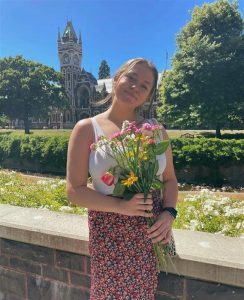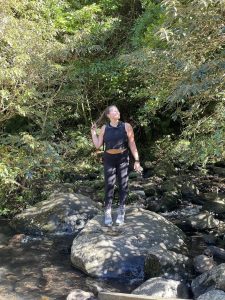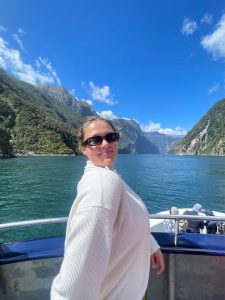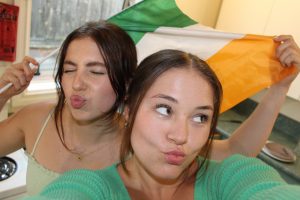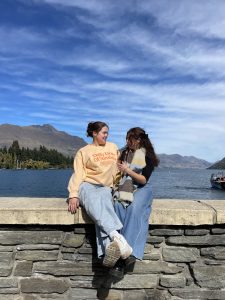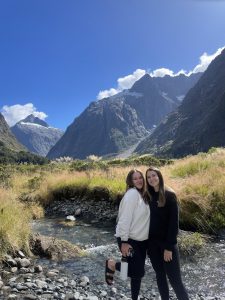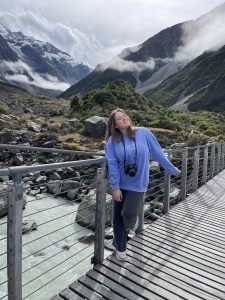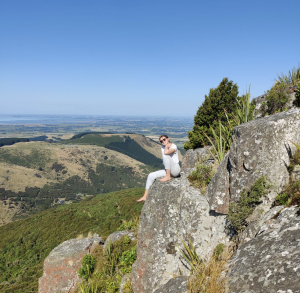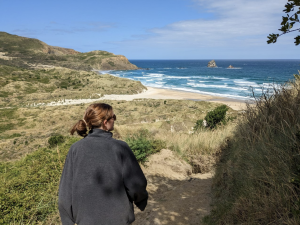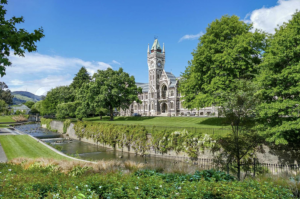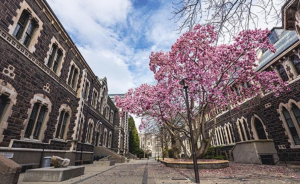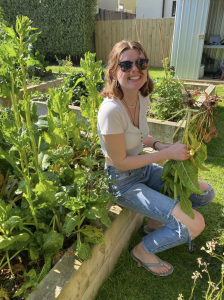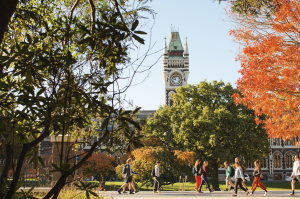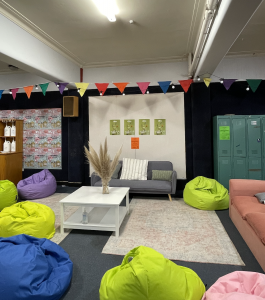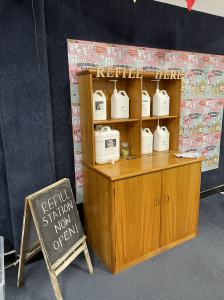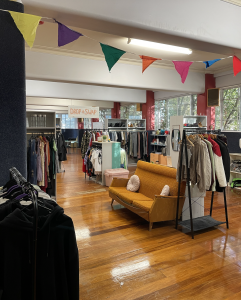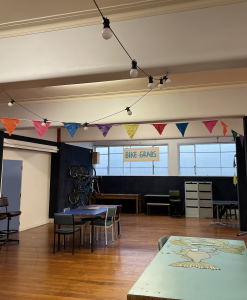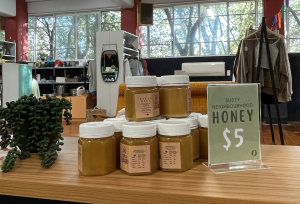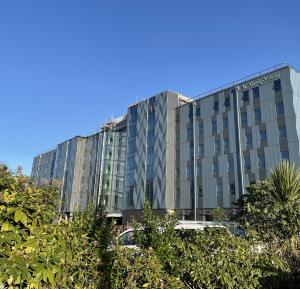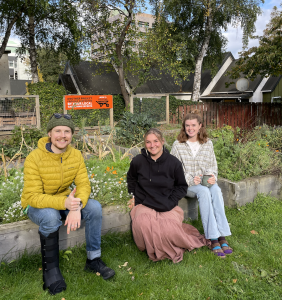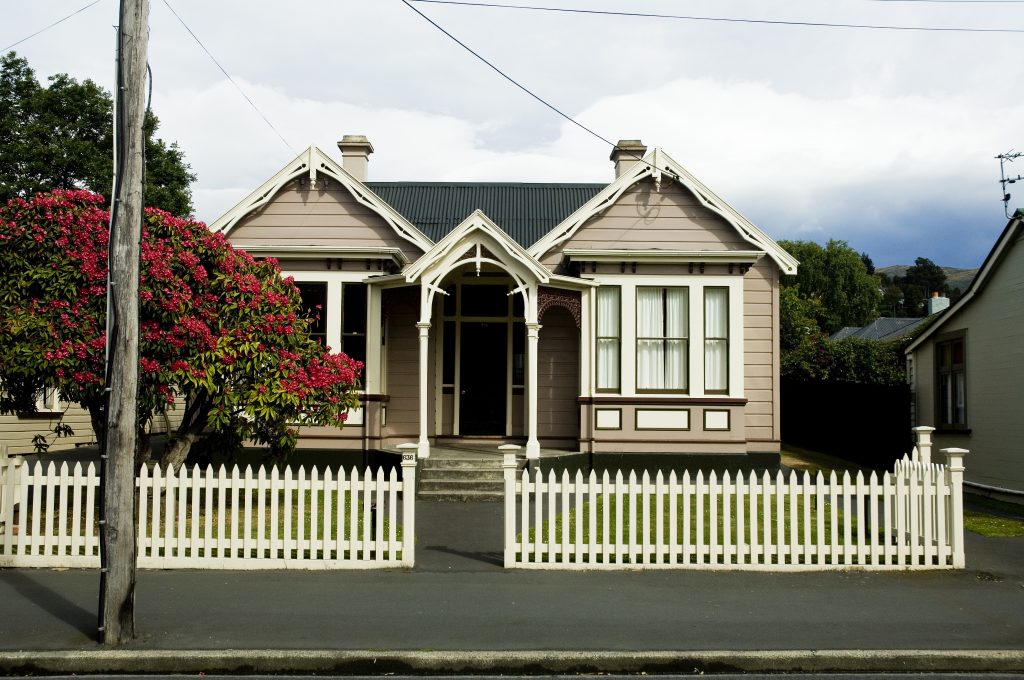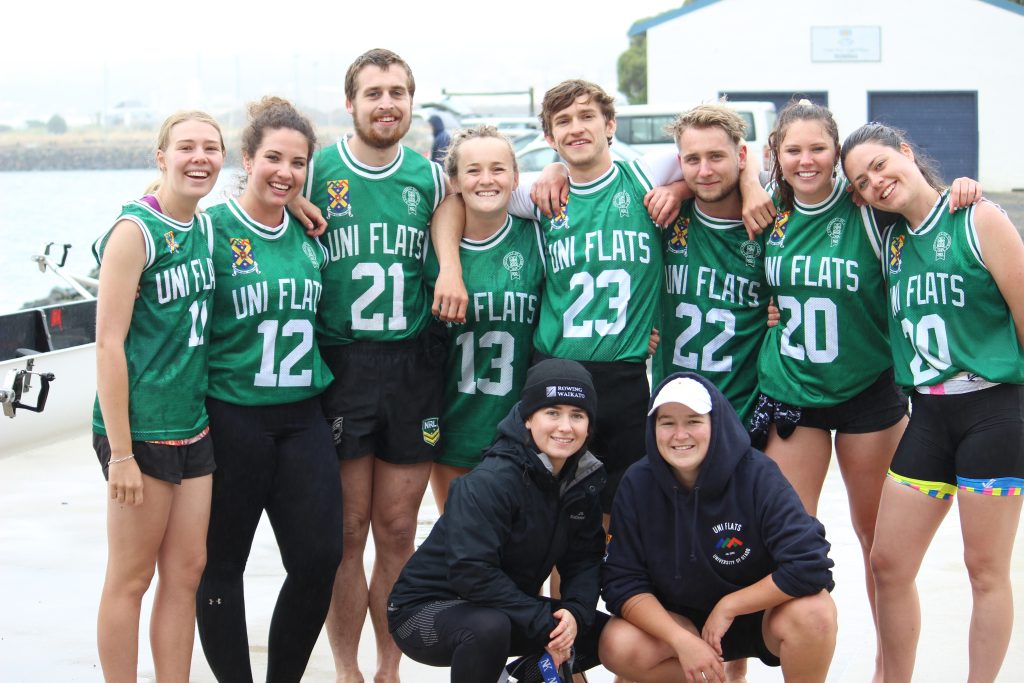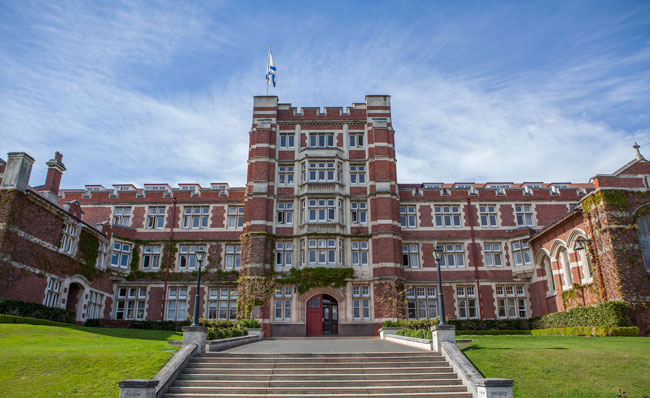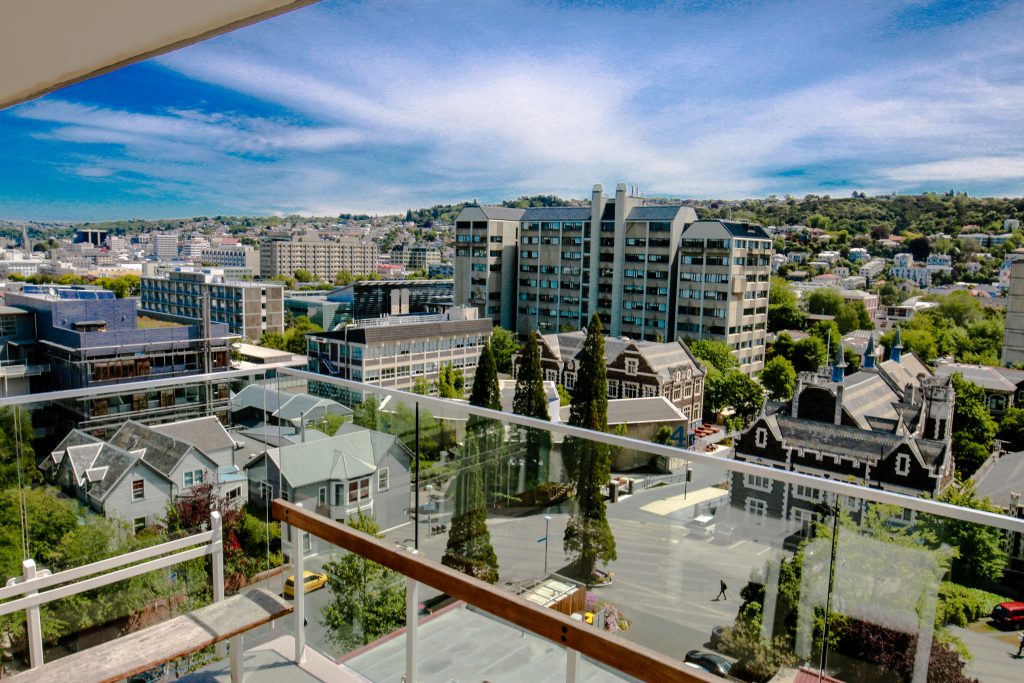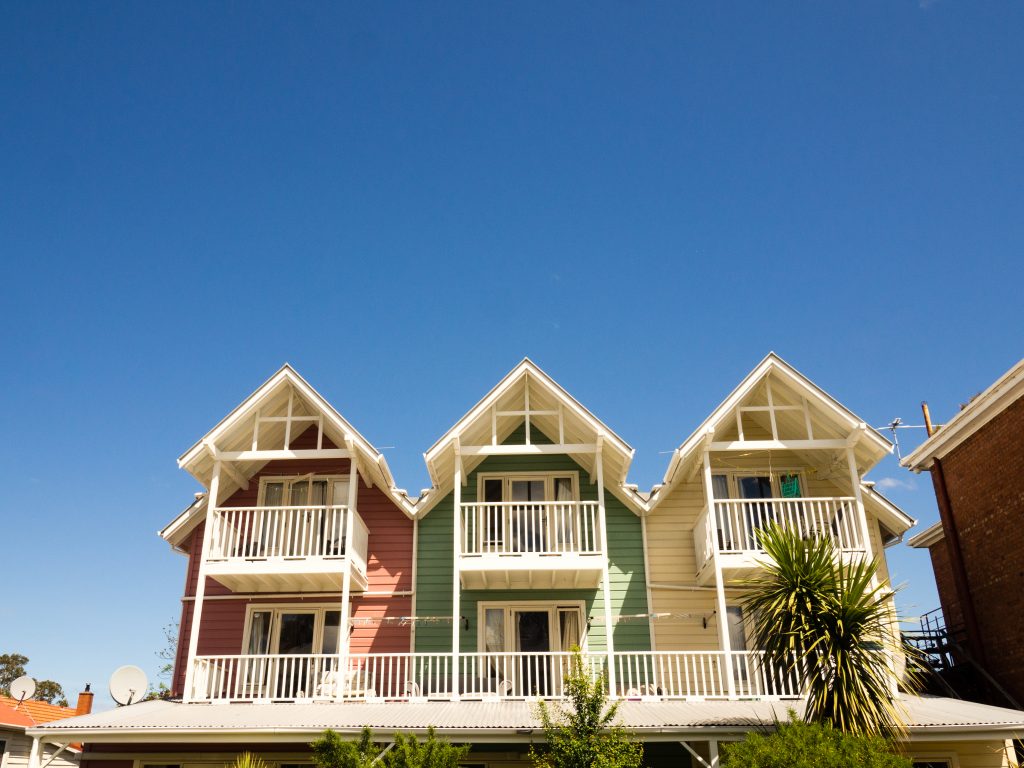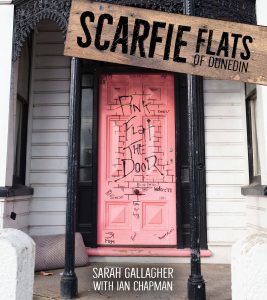Transitioning from Study Abroad to Full Degree: Neve Oettinger’s ‘Miracle’ Discovery at the University of Otago
Before her arrival at the University of Otago, Study Abroad student Neve Oettinger never imagined she wouldn’t be returning to her home in Minnesota, USA, at the end of her semester in New Zealand. In fact, Neve hadn’t initially planned on attending Otago at all, having already applied and paid application fees for another New Zealand university. Yet, in what she describes as a ‘miracle,’ Neve discovered Otago for the first time when by chance, she decided to look at other options, having only seen her prior choice when previously searching her major.
“One day I randomly looked at my university’s study abroad page and typed in New Zealand, then Otago came up and I looked at the pictures of the surrounding area, did more research, and found they offered my papers. So I cancelled my other application and applied to Otago! It’s like a miracle now because it’s perfect.”
Today, as semester one comes to a close, Neve sits before us as a full degree University of Otago student and will remain here next year to graduate. So we sat down with Neve to reflect on her self-labelled ‘bold choices’ and to hear how her Otago experience has been beautifully shaped by community, friendship, support, nature and connection.
Neve, it is wonderful to have you here! What are you currently studying?
“Sociology and I’m majoring in Criminology.”
What inspired you to choose New Zealand as your country of study?
“A lot of people from the United States go to Europe, and I knew I wanted a unique experience, somewhere with a lot of nature. New Zealand has a lot of nature and is a lot smaller than the United States which is exactly what I wanted.”
Have you felt a sense of community since you’ve been here? Have you fit in easily?
“Yes, it’s actually crazy. First of all [Otago] is a lot smaller than my home university which I really like because at home I always felt lost in the crowd, I didn’t know my professors’ names and they didn’t know mine- we had like 800 people in a lecture. So it’s nice here, it almost feels like the size of high-school classes which is nice because I actually have relationships with my lecturers and other students!
I always see familiar faces, I might not know their name, but I see the same people around, which is so different, because you would never see the same person twice where I am from.
Before I came here I was researching Otago on social media and a Kiwi girl called Ruby popped up and she felt like my vibe so I reached out. We have talked ever since then and now it has been over a year since and when I arrived we met right away- now she’s like my best friend and I am living with her next year. It’s something I felt I really missed back home [people that I clicked with closely].”
Why did you choose the University of Otago? What about our University stood out to you specifically?
“Otago is perfect. I love that it is so close to nature, and that is something that I don’t think other places have to the same extent. It’s just crazy, there are so many things to do in the South Island even that I have already done and it’s all relatively close- especially coming from the United States.
It surprised me how much everyone loves international students here, as soon as they hear me they want to know where I am from, what my life has been like…it is so cool.”
As a Study Abroad student, when you came here, did you feel adequately supported?
“I definitely think so. Teri (Regional Market Manager) was my first form of contact, if I ever needed anything I could ask her. I came here a month early and I travelled so I didn’t plan that much, all of my course plans for classes have a section for International Support, and I haven’t needed to reach out so I guess that’s a good sign! Living in UniFlats as well, my Kiwi host Claire answers all of my questions.”
How has your experience been living in a UniFlat so far?
“I love it. It’s awesome. I got really lucky with my friends, I live in a house with four girls including me, the others are from Ireland, Columbia and the UK. It’s been great. UniFlat’s and the UniFlat Facebook group is basically how I met all of my friends here.
On the Facebook page, everyone will post about themselves before they come and I even met another girl from Minnesota and we hang out here. At least fifteen friends I’ve made through the Facebook page, it’s not been hard, of course you have to make some effort but that goes for everything!”
“I have the most amazing location. It’s nice because UniFlats is spread throughout [the student area] so you’re mixed with other students- it’s really nice. Even my Kiwi friend Ruby lives six houses down from me by chance!
It is so awesome getting to live by people who are all in the same situation as you, which is something I didn’t have at home- it could be very dangerous for girls to live alone in houses.”
Have you felt safe here?
“Weirdly safe, so safe. It is so weird being able to walk alone in the dark and not feel scared, which is not quite the case where I am from.”
What inspired you to transition to becoming a full degree University of Otago student?
“I knew when I came here and met all my friends, instantly I knew that this is where I was meant to be.
It was a little stressful trying to make the decision but I thought if I am happy here I should follow that, I feel so at home, I knew I was happier here.”
What have been your favourite experiences at Otago so far?
“Meeting all new people. I love meeting new people, I have friends from Hungary, Ireland, the UK, Columbia, Sweden, all these different places. It’s cool learning about their cultures- it has just been awesome. It is nice having everyone in the same situation, everyone is looking for friends, everyone wants the most out of their experience.
People are very welcoming and inclusive, including my friends from New Zealand (…) they love to take me out and show me new things.”
A huge drawcard for international students here is the accessibility of study and travel. Have you taken advantage of this?
“Before school started I was here for a month, but I didn’t do much travel. We went to St Clair beach a tonne while I was settling in, we went to the Peninsula and did the Penguin experience, it was so fun.
Over mid-sem break myself and my flatmate took a road trip, we rented a car from the airport and we just figured it out. We went to Mount Cook, which is beautiful, I love Mount Cook. Then from there to Lake Tekapo, Kaikōura, Nelson, Akaroa and then back to Dunedin (…) it was so great. I think my favourite was Mount Cook and I can’t wait to go back to Lake Tekapo in the summer. We went sunset Kayaking in Nelson and we saw so many seals, they swam right by us!
I’ve been to Queenstown twice (…) we took the bus which is really nice, the bus will take you so many places here, like Queenstown and back which is so easy, way easier than renting a car, it’s so awesome. We did a lake hike and there is a bead shop [in Queenstown] where we all made bracelets and earrings, it helped us all get to know each other and it was so wholesome.”
What are the stand-out highlights of the University of Otago?
“The community, the nature, friendships, connection with my lecturers and the international support. Honestly, the accessibility to travel is so nice (…) it is so easy because everyone does it, people text all the time in the UniFlat page with extra spots in their cars for road trips.
This summer I am going to Mount Manganui, then for my 21st we are visiting Wellington and I have plans to go to Christchurch next semester. There’s a lot to do!”
What would you say to future students considering a Study Abroad experience at the University of Otago?
“Definitely do it. I’ve had so many people reaching out to me on Instagram wanting to come here! It is such a hidden gem. When people think of New Zealand they think of Auckland or the North Island, but the South Island just has so many things to see. I think it’s awesome, it’s a great sense of community.”
You’re a Kiwi girl at heart it seems…
“Exactly yeah, I am meant to be here!”
Do you have a taste for adventure? Ready to try something new? Study Abroad at the University of Otago and like Neve, experience a world-class education while travelling the country. Have an authentic “Kiwi” student experience living amongst the locals in our University-owned UniFlats, and receive excellent support from our International Support Team.
Start your adventure today!
Check out our Study Abroad options here.
Life as a UniFlats ‘Kiwi Host’ at Otago: An Interview with Millie Gillard
Tell me a little about your way to Otago – Why did you choose to study in Dunedin?
My Dad is a Kiwi and my Mum is from the UK. I completed my undergraduate study in the UK, and as a dual citizen I had the opportunity to pursue graduate study in New Zealand. Otago had the perfect course that I was looking for – the Master of Science Communication. I had never been to Dunedin before but I had family members who had gone through Otago and had an amazing time. I had heard good things, and so it was not a tough decision to study here.
How long have you been a Kiwi Host in the Uni Flats and what made you apply to become one?
I have been a KiwiHost for 1 year now. I was excited about the opportunity to connect with people from a variety of cultures and backgrounds. I love meeting people and this is such a lovely way to do that. I like to support people and make them feel comfortable and find a home away from home. I have the unique perspective of being a ‘Kiwi’ but also share experiences with the international students, so it’s a great fit.
What has been your most fun experience of introducing foreigners to Kiwi life?
One of my favourite things is watching international students experience the funny little language differences for the first time, for example words like ‘togs’ (swimwear) or ‘heaps’ (lots)… even for the native English speakers. It is fun to compare different slang terminology. It’s the same for cultural nuances, like New Zealanders talk a lot… especially small talk. It takes everyone a bit of getting used to. In a good way.
What is a common New Zealand thing newcomers often don’t know about or are surprised about?
Something surprising is actually how welcoming New Zealanders are. Most international students know about that or have read about it… but they are still very surprised about just how friendly Kiwis are. For example, a New Zealander might just invite you into their home after just meeting you, which is very different to the UK or Europe way of doing things. It’s seen as a lot more normal here. Kiwis are very warm, even with strangers. One of my flatmates is Swedish, and she was so surprised by the amount of ‘small talk’ that happens with Kiwis. It’s a friendly thing, but very unusual for some cultures.
I also think international students are surprised by how much is going on in Dunedin for such a small city. If you compare it to large cities in the UK or Europe.. It only has 130,000 people, but there is a huge population of younger people so there is a great energy and vibrancy at all times. 45% of Dunedin residents are under the age of 30. The city functions for and with the students and so it’s a great city for young people. There is always a lot to do and it’s very accessible and activities are affordable.
What is your favourite place in Dunedin, and on campus?
My favourite place in Dunedin is the Otago Peninsula. I love Sandfly Bay, which has beautiful coastal views and large sand dunes. It’s like nothing I’ve seen before. The drive to get there along the top of the peninsula is just incredible too. It’s not something that we see very often- a city that is vibrant and has a lot to do, but also has these amazing, unique natural spaces. In the Dunedin centre I love the botanical gardens right next to campus, and feeding the ducks.
My favourite spot on campus is the Leith river and the green banks by the Clocktower. It doesn’t matter what the weather is doing, that space is always very beautiful. There are also lots of little hidden walkways and gardens, shaded by foliage with little benches that are great spots for your lunch break. You can find tranquil little quiet spots in the middle of a bustling campus. And the Magnolia trees in bloom outside the Clocktower – just gorgeous.
One important part of Uni Flats is the matching system. As I understand, you name some likes and dislikes as part of your application and your host and flatmates are chosen on that basis. Can you give an example where you noticed that specific questions led certain people to live with you and how it shapes your community in the house?
Yes – this is a huge part of why students enjoy the UniFlats. The team takes a lot of care to match people with other international students with similar interests. People are brought together by shared interests in things hiking or skiing, or even cooking and creative activities.
My flat is part of the Sustainability neighbourhood which students can apply to be part of in their UniFlats application. We are focused as a group on living more sustainably – we grow food in a garden, we compost, recycle and strive to be energy efficient. We also have a worm farm and there are bees in the garden as well! This is something that has worked really well for us – we are all coming together with a shared interest in sustainability. Everyone is on the same wavelength which is great. I’ve become so interested in gardening, which I never was before. We have a weekly working session in the garden, and a monthly ‘hui’ meeting where we talk about what we want to do with the Sustainability Neighbourhood moving forward. I love it.
How free are you in self-governing your flat? What are some of the biggest differences in between the various Uni Flats?
KiwiHosts are not authority figures, rather they are like a local liaison, or a ‘first friend’ in New Zealand. It’s a flatmate who already knows the ropes. In our house, we all contribute and come together for decision making. At the beginning of the semester a Kiwihost might take the lead a bit to provide early support – like showing international students around, where the good supermarkets are, help organise a cleaning roster… which I was more than happy to do of course. I also was the only member of the flat to have a car for a long time, so I initiated a lot of weekend activities while people settled in. Now we have a tradition in our flat where we always go to the local pub (‘The Bog’) for the weekly Quiz Night. It’s so fun. We are terrible, but it’s a great way to spend time together each week.
I have heard there’s a tradition in naming the flats. What are some of the names? / What is the name of yours?
This is a tradition for Otago flats in general that has been around since the 80s I think. It has always been a big part of Otago culture and many flats have fun names, e.g ‘Buckingham Palace’ on Queen Street, or ‘The 7eleven’ on 711 Cumberland street. UniFlats are more known for the part of campus they own, and are known for being the cleanest and warmest flats on campus!
Which experiences should no foreign exchange student miss out on while they are in New Zealand?
There are just so many things. My must do is definitely to go on a road trip in the South Island and see the lakes, the mountains and all the natural scenery and landscapes that this part of the world has to offer. You can drive 2-3 hours in any direction from the Otago campus and find something spectacular. It’s best to see New Zealand by car. There is nowhere else like it.
Also make the most of the local wildlife. I was at the beach recently and just happened to see a penguin, which is completely bizarre to anyone not from New Zealand. I also know someone who recently went to Stuart Island and saw a kiwi bird when they were walking home from the pub. If you get to experience that, it is so so special. New Zealand is so unique in that way and students should make the most of it.
And if you get a chance to visit a marae – that is very special too. Recently the UniFlats group went on a trip to Karitane for a Maori cultural experience and they told me it was so beautiful and authentic. Another special part of New Zealand culture for sure.
At the University – the Clubs and Societies are something I recommend getting involved in. I joined the Kayaking club, and it was a great way to see things and to meet new people. The societies are very social, which I really enjoyed.
And finally, what would you recommend to a German student who is interested in living in the Uni Flats but isn’t sure whether it’s “for them”?
I would 100% recommend UniFlats over trying to find private accommodation in the city – because this accommodation is designed for international students. The lease structure works well, the flats are warm and well looked after, linen and appliances are provided, and most importantly you are matched with students that share your interests. It’s a comfortable option, and is a great way to meet people – other international students and New Zealand students. International students who come to Otago are motivated to make the most of the experience of being in New Zealand. Everyone is very keen to go and do things together. It really is such an important part of the Otago international student experience.
Do you think you will stay friends with your current flatmates?
Absolutely – my Scottish flatmate and I have a road trip planned at the end of the semester. I can’t wait.
**This article was originally written and published by Sören Jonsson – College Contact
Sustainability in Action at New Zealand’s First University
Through the reuse of materials and products, from honey to bicycles, a circular economy has been successfully established within the walls of Otago University’s Dunedin Campus.
It only takes a short walk through the University of Otago campus (we like to call it ‘the Sustainability Walk’) to see the success that is possible when sustainability is at the forefront of collective action.
The current limiting of waste, regeneration of materials and other initiatives in operation pave the path for a more sustainable future, demonstrating the possibilities and positive impact of a circular economy in action!
Te Oraka: Thrift, Swap, Refill and Grab!
Te Oraka, the University of Otago’s on campus thrift store, was first sustainable initiative visited – and when we say this place is impressive, we really mean it! Located on 96 Anzac Avenue, Te Oraka is a hidden gem for Otago’s student population, with a purpose for greater sustainability on campus.
Te Oraka is a community driven, positive space – there’s an area decorated with bean bags, comfy chairs and a projector, which hosts student community film screenings. There’s a refill station equipped with dishwashing, laundry liquid and body wash, aiming to diminish waste and support students.
There’s a ‘Drop & Swap,’ where you can shop for new clothes or household items and pay or exchange with your second-hand items. Lastly, there’s the ‘Bike Grab’, which collects second-hand bikes for student use to encourage different modes of travel around campus.
The shop further hosts ‘repair café’ workshops, teaching students how to repair clothing, among other sustainably minded practices, aimed at giving items a second life. Te Oraka further has household items, such as kitchenware and furniture, all with an aim to ease the consumption that accompanies a new flatting year, minimising waste and encouraging second-hand purchasing.
Te Oraka even sells their own honey! Produced by bees within the Sustainability Neighbourhood and residential colleges Aquinas, Arana, Toroa and Carrington, the honey is processed and collected by a local apiarist, Otto. The honey is then bought back at cost and sold to the university community, supplied back to the neighbourhood and college kitchens, sustaining a circular economy within the University.
“When the students are putting honey on their toast in the morning, it was collected by the bees in the garden of the college where they live… it’s trying to create more of a sense of place, a sense of belonging.” – Ray O’Brien, Head of Sustainability
Winners of the student engagement category at the 2022 Australasian Green Gown Awards (which includes entry to the global awards), Te Oraka’s practices represent the circular economy possible from recycling, re-using and re-investing funds into sustainable practices and products. Te Oraka further functions as a ‘living lab’, meaning their sustainable practices showcase what could be introduced on a larger scale within the University.
“One of the core ways that we are going to make a difference is by engaging more and more students, because every student we engage with, often lives a long productive life of leading change as they go… which is why things like Te Oraka and the Sustainability Neighbourhood are so core to what we do.” – Ray O’Brien, Head of Sustainability
Te Oraka is absolutely worth a visit and is the perfect place to collect a variety of flatting goods, clothing and furniture, all while incorporating sustainable practices into your daily life. Purchased flatting goods can be later returned, thus contributing to the circular flow of sustainability, and reducing waste.
Open: Tuesdays and Thursdays between 11am and 1pm, operated by the Sustainability office.
Te Rangihīroa Residential College (Open for applications for 2024)
Our second stop was Te Rangihīroa, a large and visually impressive residential college with sustainable aims. The college is named after Te Rangihīroa, the first Māori medical graduate from a New Zealand University. Te Rangihīroa is remembered as a leader and a doctor who dedicated his life to servicing the Māori community, and the heath issues that impacted this community in the early twentieth century. The college has been designed with input from Te Rangihīroa’s Ngāti Mutunga iwi and local Ngāi Tahu.
When completed, Te Rangihīroa will qualify as a 5-Star Greenstar building, which is deemed New Zealand excellence and is built with sustainable practice and purpose. Green Star certification functions to holistically analyse building performance and environmental impact.
Te Rangihīroa will have 150 ensuite bedrooms, and house 450 University of Otago residents. It features a spacious dining room, music and media rooms, study spaces and social spaces. Applications for the college (located on 15 Forth Street) open on 1 August 2023.
Iwi
Noun New Zealand
A Māori community or people.
Ngāti Mutunga
One of eight generally recognised iwi of Taranaki.
Ngāi Tahu
The principal Māori iwi of the South Island
The Carpark Living Lab
Otago University’s dedication to the incorporation of sustainability ventures within the institution itself, looking at issues such as carparking, the space these take up, and how we can an encourage alternative modes of travel, reducing community emissions.
The Albany Street Staff Carpark is an example of smaller sustainable changes that could be incorporated on a larger scale within the University community. The carpark will feature an electric bike charging station and a park-swapping system.
Albany Street is currently under a project of reconstruction with a bike lane and larger bus stops being installed.
“Students wise, we’ve got about 80% of our undergrads within a few kilometres of campus (…) senior students start to move further away, but even with staff we have around 80% living within five kilometres of campus.
We have some challenging terrain and sometimes some challenging weather as well so this living lab is about figuring out how can we make that shift to more sustainable practices (…) how we can unlock people from being car commuters…” – Ray O’Brien, Head of Sustainability
A carparking system through a phone application that allows carpark users to rent out their spots, is the tool to supporting more sustainable modes of travel, believes O’Brien, allowing car users flexibility. There will further be an electric scooter rack, while the overall carpark will function as a living lab, heavily incorporating student learning.
The carpark is located on 99 Albany Street.
The Sustainability Neighbourhood
The final stop of our walk was the Sustainability Neighbourhood, which offers the Otago flatting experience with an added focus on sustainability. The Sustainability Neighbourhood is comprised of a group of flats set up to encourage and establish environmentally conscious living practices, set up to allow residents to grow food, compost, recycle, be energy efficient, and lead active healthy lives.
Within the Sustainability Neighbourhood, residents are inspired to live their values through creating monthly huis, so far having a waste management expert visiting and teaching the residents about recycling and minimising waste, alongside advice on gardening.
The Neighbourhood currently houses many international students, which is highly beneficial says Demi Lawrence, the Student Lead of the Sustainability Office, with students from all walks of life offering knowledge and advise on a common sustainable cause. The Neighbourhood has a bike rack, vegetable garden, greenhouse, composting station, beehives, a worm farm, and high-quality University-owned flats.
Students can engage in a range of activities, including growing and eating their own food.
If you’re dedicated to sustainable living practices, willing to contribute and looking for a like-minded community, the Sustainability Neighbourhood is for you. The Neighbourhood is a space of embodying values through action and sets out to make a larger difference as a ‘living lab,’ which is believed to have a widespread impact on the student flatting scene.
Hui
Noun
(in New Zealand) a large social or ceremonial gathering.
The ‘Sustainability Walk’ is a truly inspiring example of what is possible at the University of Otago, in an environment that fosters learning, growth and community. The shared values of sustainability across campus at several levels, alongside the successful circular economy, showcase the university’s commitment to sustainable practices, and hold with them the promise of a greener future.
The University of Otago is ranked 63rd in the global Times Higher Education (THE) Impact Rankings 2023. The rankings measure universities internationally to evaluate their performances against the United Nations’ Sustainable Development Goals (SDGS).
Interested in sustainability at Otago?
Incorporate climate change perspectives into your degree!
Subjects and courses available for international students
Check out the Sustainability Office!
Accommodation at Otago – where will I stay?
So, you’re thinking of being brave, adventurous and independent and leaving your home country to come and study at the University of Otago? We love to see all the new and returning faces of our international students, and we also like to think that we can answer a few of the many questions you may have before you get on board that plane and take a leap of faith to come to our beautiful little corner of the world. So today’s blog focuses on where you will live when you come here, we’ve got a few options to offer accommodation wise – it all depends on what kind of living experience you are looking for, so here we go!
University Flats (Uni Flats)
Uni Flats is probably our most popular option for international students. Before I go any further I think a little translation of kiwi is necessary, a flat in New Zealand is actually accommodation, often a house like the one pictured above, which is shared with others. These flats are very close to campus so you will be right in the heart of student life. Each flatmate has their own bedroom with kitchen, bathroom, laundry and living areas as shared spaces. So you’re living pretty independently, but you’re not alone.
Any full time international student who is coming to Otago for one or two semesters can apply to live in a Uni Flat. Up to six international students live in a co-ed flat, accompanied by one or two kiwi hosts. A kiwi host is a New Zealand student, who will help you settle in to your new environment and this is one of the best ways to assimilate into a culture – by hanging out with the locals! These flats are extremely popular and are managed by the University, are autonomous but offer a supportive and pastoral care service, have plenty of recreational and social activities – so if you’re thinking of coming to Otago, make sure you apply as soon as possible.
Residential Colleges
If you like the idea of having your breakfast, lunch and dinner prepared for you (sounds good to me), and enjoy meeting and living with lots of people, perhaps one of our residential colleges is what you need? We have 15 residential colleges at Otago that accommodate 3,500 students and plans are afoot to build more! There are so many different options, if you like the idea of a traditional, historic and architecturally impressive college, look no further than the castle like Knox College (pictured above) or Selwyn College.
Or if you want to be right in the heart of campus St Margaret’s College is one to note, or take a look at the view from Unicol (University College) in the photo above – Unicol is our largest and possibly liveliest college. We also understand that post-graduate students may also like the care provided by a college, but aren’t quite as interested in the social aspect so we have a designated post-graduate college – Abbey College.
Private, Short Term or Temporary Accommodation
If for whatever reason you’re not interested in flatting, or living in a college, or you’re just wanting to find private accommodation, or accommodation for a short time or you have any queries our international accommodation adviser from the University of Otago Accommodation Centre can offer advice – international.accommodation@otago.ac.nz.
Dunedin flats in general require a particular mention here, recently Sarah Gallagher, of the Dunedin Flat Names Project, and Dr Ian Chapman, Senior Lecturer in Performing Arts at the University of Otago, have collaborated together to create a visually appealing and witty book entitled ‘Scarfie Flats of Dunedin’ featuring a selection of well known and lesser known named flats – yes, students have named their flats.
And remember If past domestic and international student’s testimonials are anything to go by, the time you spend at Otago, outside of classes and laboratories will no doubt lead you to new experiences, opportunities, friendships and memories that will stay with you for your lifetime. Many alumni lament and say……oh, those were the days……take me back to Otago……!
Nicky Richardson is an International Marketing Coordinator at the University of Otago. With degrees in music and marketing, she is a recent graduate of Otago herself – she loves Otago so much she ended up getting a job here!

